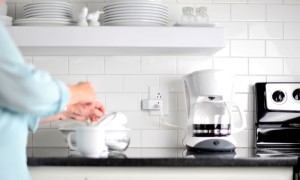Technology to assist caregivers is becoming more common. Which ones work? Which ones truly help loved ones remain independent longer. This technology is unobtrusive and appears entirely manageable and affordable for families. – Brenda Avadian, MA of The Caregiver’s Voice
Created to help protect seniors while allowing them to maintain their independence, Evermind is a new technology that detects when electrical appliances — such as coffee makers, televisions, or bedside lamps – are switched on and off.
Dr. Dave Gilbert developed Evermind so that his 96-year-old grandmother could live independently in her own home. “Knowing that she is in her routine gives me peace of mind,” said Gilbert.
Using built-in wireless Internet, caregivers can receive text messages or email notifications when an appliance is used or not used within a specific period — primarily when changes in a daily routine could be cause for concern. For example, if an aging grandmother doesn’t turn on the evening news, her grandson will be notified via text and can check on her.
Plug in, turn on, stay connected.
Evermind is based on a simple concept and is easy to install. Evermind’s unique, unobtrusive design uses three sensors that simply plug into wall outlets, and then electrical appliances plug into the sensors. Evermind detects when those appliances are switched on and off and provides that information through a secured account. No home Internet connection is required, only the ability for the sensor to connect to the Verizon cell network. [The Caregiver’s Voice requested additional information re: this and received the following explantion: “Evermind automatically connects to the Verizon cell network at no charge to the user. A user’s personal cell phone company or network is irrelevant.”]
As a caregiver, through your personal account on the Evermind website, you can customize the text or e-mail notifications you want to receive.
Depending on your loved one’s habits and needs, you may choose to only be notified the first time an appliance is used each day. For example, you would know that your mother is up and starting her day with her morning cup of coffee. [The adapter is barely noticeable. See it plugged into the wall outlet in the image above? TCV Ed.]
Or you may want to be notified if there is no appliance activity during parts of the day. For example, the system can notify you that your mother, who usually turns on her bedroom lamp when she’s getting ready for bed, hasn’t turned on her lamp yet. How you decide to respond is up to you.
Evermind is a conversation starter.
In addition to peace of mind about immediate safety, Evermind provides useful information about your loved one’s overall well-being. For example, by reviewing the past few days of activity on your account’s timeline you might notice that your mother has begun making coffee at 2 a.m., rather than 7 a.m. This information gives you the opportunity to talk to your mom about her schedule — perhaps there is a medication adjustment needed?
Is your mother watching more TV than usual? Is she socializing less? Evermind can help you notice. The Weekly Usage card on your account’s timeline will compare this week’s appliance activity with last week’s.
Is your mother getting enough sleep? With the Overnight Report card on your account’s timeline, Evermind will let you know the last appliance used the night before and the first appliance used the next day. The nine hours of no activity is clearly identified to show you time likely spent sleeping.
Busy at work but curious about what your mother is up to today? With Evermind’s Daily Activity card on your account’s timeline, you can check on what she’s doing in real time from any device.
Donita, a caregiver to her mother, 82, enjoys the peace of mind Evermind brings her:
Earlier this week Mom felt well enough to drive to a doctor’s appointment a few miles from the house, but a storm came up while I was teaching.
I wondered if Mom made it home OK and quickly checked Evermind cards to see that she’d turned on the microwave at lunchtime. I wouldn’t have been able to make a phone call then since I was teaching, but quickly looking on my Evermind account was reassuring.
The Evermind system [Updated 8/3/2017: Link to evermind.us/ no longer works] is available with three sensors for about $200 with a $29 monthly service fee. [For working families spending hours away from home, The Caregiver’s Voice believes this is a reasonable price to eliminate worry.] 
Dawn White, Director of Business Development at Evermind, Inc., holds a master’s degree in composition and rhetoric from Eastern Michigan University. White taught writing at several community colleges and has experience as a corporate technical writer. White lives in Saline, Michigan with her husband and two teenage children










While I think this is a step in the right direction, something about it doesn’t feel right with me.
I guess I think the adult child will be sitting there waiting for Mom to run the microwave which will cause undue stress. What if Mom uses the stove that day or she’s using the microwave because she’s too sick to cook?
And are our daily routines really that consistent to provide peace of mind with 3 sensors?
I do see the value in knowing the coffee pot is coming on at 2 am or the bathroom light was switched on numerous times throughout the night.
I guess this might need to come with some consultation so the adult child doesn’t set it up in a manner that results in added stress.
Mike, thank you for providing a different perspective–one, that may be on the mind of many concerned caregivers.
My thinking is, this is a start. A place to begin. And yes, some of us do fall into routines. Many elders living alone are comforted by their daily TV shows at scheduled times. Heck, if I don’t get my coffee made between 5:30 and 6:30 each morning… well, all bets are off! 😉
I absolutely agree Brenda, and I’m the same way with my coffee. Problem is that it’s on a timer – lol.